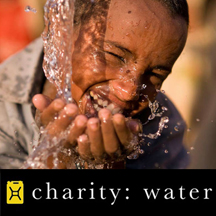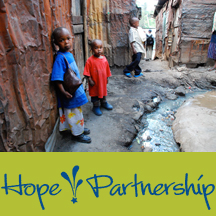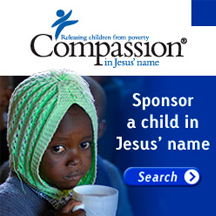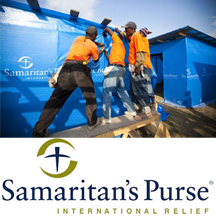Prescription for Hope, Part 1
 Monday, October 26, 2009 at 11:14AM
Monday, October 26, 2009 at 11:14AM  MAD21
MAD21 By MAD21
A few months ago, I posted an awesome interview I had with Stacey Wilson from Samaritan's Purse's Operation Christmas Child. I was recently blessed with another opportunity to interview someone from a different group within Samaritan's Purse called, Prescription for Hope. I was less familiar with this group so when I had the chance to talk with them, I was happy to do so if anything to learn more about it myself.
Thanks so much to Ashley Wagoner and everyone else at Prescription for Hope who may have helped put these answers together. I pray they will be richly blessed for taking the time to talk with us.
This interview will be a 2-part series. I hope you enjoy it, but mostly I pray that you learn something, and that it will encourage you to act. To love the "untouchables" as has God has loved us.
Prescription For Hope
MAD21: How do you explain to people what you do for a living?
Ashley: I work with Samaritan’s Purse headquarters in our international HIV/AIDS ministry. On a day to day basis, I compile proposals and progress reports from the country offices where we work, coordinate production for any type of video, brochure or web work we need, schedule and produce campus and conference events, etc.
On occasion, I’ll lead a church team on a trip to one of our project sites overseas. People seem most excited to hear about the job’s traveling side. While it’s certainly not as glamorous as it always sounds, seeing firsthand how God is truly changing entire communities through our work helps fuel everything I do here at headquarters.
MAD21: What is Prescription for Hope?
Ashley: Seven years ago, the HIV/AIDS arm of Samaritan’s Purse started with a conference called "Prescription for Hope," led by Franklin Graham. More than 900 Christian leaders gathered from all over the world, and made a commitment to respond to this issue with Biblical wisdom, Christ-like compassion and love. This marked a turning point in AIDS policy, and several Christian responses to AIDS started as a result. Ours was one of them.
Since 2002, more than 1 MILLION people have received Biblically-based education on the disease through our programs that promote abstinence and faithfulness.
With 33 million people living with HIV, and another 15 million kids left parentless, our dream is to see the body of Christ join in a unified effort to respond to this disease, and help minister the hope of a Savior to some of the most hope-less out there.
MAD21: My understanding is that ‘Be the Virus’ is a program within the HIV/AIDS ministry to get people involved. Is that correct? What is the difference between involvement in the main HIV/AIDS program and Be the Virus?
Ashley: Yes, you’re exactly right. Be the Virus is a campaign we just kicked off last year. The idea is that we can "spread an epidemic of HOPE for HIV/AIDS," and that impacting an individual with the hope of Christ ends up influencing their family and entire community.
We realized that, within the body of Christ, people felt they should be doing something about AIDS, but didn't really know what to do or how to do it. Be the Virus was a response to this need, and serves as a catalyst to help “tell the story” and provide people with opportunities to get involved. There are several components of Be the Virus, including a traveling experiential photography exhibit and an interactive campus or church event that helps an American audience understand the need overseas.
MAD21: How does Prescription for Hope decide what areas to serve? I know that you use available resources (i.e., established churches) but do you ever go and build churches and schools in the areas that need them?
Ashley: At Samaritan’s Purse we try to find a way to reach those who are truly “the least of these.” We want to minister the love of Christ to those who no one else will minister to in the places no one else will go. We want to help those in places where the disease has really taken its toll, whether it’s in the slums of Phnom Penh, Cambodia or the war-torn aftermath of Liberia.
Since Samaritan’s Purse is one of the leading disaster relief agencies, a large-scale disaster might allow us initial access into a country. And often, the countries will invite us to stay and continue our work in the years to follow. Many of our projects began this way.
One of the most incredible characteristics of Samaritan’s Purse I’ve seen is how it’s truly a comprehensive ministry. We have so many different programs within the ministry we can partner with, so that the impact of our HIV/AIDS work goes far beyond just prevention education and testing. This means teaming up with other programs to provide people living with AIDS vital necessities like agricultural training, clean water and education. And many of our AIDS orphans even receive shoe box gifts from Operation Christmas Child!
MAD21: What is it like to work for Prescription for Hope? How is it the same or different from other jobs you've had?
Ashley: Anyone who works in international relief will agree that it’s a roller coaster ride for sure, full of its own ups and downs. What’s most amazing is getting to see that the work I do TRULY matters and makes an eternally profound impact in the lives of others. This is the first job I’ve had where I could say that.
MAD21: How it has affected your life? And how you have personally seen it affect others?
Ashley: I’ve become much more aware of those around me, and how my choices can have a direct impact on those who are suffering. For example, now I think about that vanilla latte before I buy it. Sure, it may only be a few bucks, but a few bucks can mean so much more to someone who has HIV and has been ostracized by their family and community.
I've seen it affect others in numerous ways! A woman named Beth comes to mind. Beth's life was changed when she heard a well-known musician and activist talk about the AIDS pandemic, and how Christians should be on the forefront of this battle. She was so impacted, that she went to the missions board at her church several times and eventually succeeded in mobilizing her church to respond to the AIDS pandemic on the six continents where they were already doing missions work. Now, we help resource her church with education materials about HIV/AIDS and Beth organized a group of women to join us on a trip to Liberia in July that I'll tell you more about later.
MAD21: Do all the employees of Prescription for Hope have the opportunity to travel to the countries/areas you serve? Have you ever done it? Please explain the experience and where you went.
Ashley: Yes, every PFH employee has had the opportunity to personally see the work we do overseas.
I've done some traveling myself, and am always blown away by our staff who work overseas, in the heart of it all. Most of my travels have taken me to various areas of Africa. Often when I travel, the days are incredibly long, we drive on some of the worst roads I’ve ever seen, and you end up physically and emotionally exhausted. It's hard, but the reward comes when you see, first-hand, the lives impacted. Generally, I'm only overseas for a few days or a few weeks at a time, but I sometimes marvel at how our international staff can live it 24 hours a day.
Recently, I took Beth and a group of seven women from her church in Illinois to work with our program for Orphans and Vulnerable Children in Liberia, which is a country in western Africa. It was an incredible trip for everyone! The ladies were able to run a kids’ camp, paint some churches, participate in a fish pond harvest, visit some caregivers of orphans who were involved in a vocational training program, and visit the homes of some community members who were infected or affected by HIV.
Below are some photos that highlight the trip:

Vocational Training – This is a photo of me with Alice, one of our caregivers for orphans who is learning to dye and cut fabric to sell through a program we established that gives skills training. She was so proud to show off her cloth to me!

Fish Harvest – Samaritan's Purse often establishes fish ponds in communities which provide a valuable source of food and income. During a "fish harvest," the pond is drained, and you climb in, knee deep in mud, to collect the fish. This particular community had a high number of orphans and children affected by AIDS, so as the fish are harvested and sold, the food and proceeds go to support the orphans in the community. The team helped harvest the fish!
I remember this one moment pretty clearly. We were traveling in rural Liberia to visit the homes of some people affected by AIDS. There was one woman we visited whose life had been drastically altered when her husband was killed in the recent Liberian civil war. During the war, rebels poured burning plastic in her eyes, taking away her sight. Even though she is elderly, blind and widowed, she's taking care of two children in her community who were orphaned, likely from AIDS.
Before we left her home, we asked if we could pray with the woman and the children she was caring for. After a time of prayer, she gave us a sort of blessing. She said we came all the way from America and could have stopped to visit anyone in Liberia, but she was so touched that we chose to visit her that she said "Because you have come to visit me, I know that the Lord lives!"
This woman represents an aspect of our work that I'm especially passionate about. The children she cares for are part of a greater program of ours that helps reach out to orphans and other children who might be at a greater risk to HIV. We encourage community members, like this one, to care for the orphans in their communities. We help by resourcing each family with things like school fees, to medical treatment, to legal services.
 Home Visit 1 – This is the woman who is providing care for the two orphans.
Home Visit 1 – This is the woman who is providing care for the two orphans.
 Home Visit 2 - She proudly invited us into her home.
Home Visit 2 - She proudly invited us into her home.
 Home Visit 3 – She was excited to show me everything in her home.
Home Visit 3 – She was excited to show me everything in her home.
 Home Visit 4 – Telling us her story.
Home Visit 4 – Telling us her story.
Be sure to come back to read Part 2 where Ashley will continue to share about her experiences with Prescription For Hope and answer more questions regarding the work they do to bring health aide and Christ to people all around the world. For now, feel free to visit Prescription for Hope's website.







Reader Comments (7)
Wow... what an impact they are having and what a difference they're making! Great interview and post, Ginny. I love the pics and am anxious to read more from Ashley's experiences!
Great post. God bless Ashley, the work she does, and the people she serves.
That is so great. What a valuable ministry! I love how she said that her work affects her everyday, thinking about what the money for that latte could mean for someone or a family. We should all be so aware... Thanks Ginny!
Wow. WOW. This is a story that NEEDS to be told! The part about the widow raising the orphans was devastating and beautiful all at the same time. You know, for being such a huge global problem, I don't hear it talked about as much as it should be in Christian circles. I wonder why that is... Imagine what it would look like if every church and missions team were able to address the AIDS crisis in areas they're already working. To see the glory of God spread like a virus to people who desperately need it.
Really really great job with this. You opened my eyes to something I hadnt really thought much about before.
Amazing story Ginny! I agree with the PP that this is a message that needs to get out! I think the stigma associated with AIDS keeps many Christians afraid to get involved with this hurt in our world. I am really looking forward to part 2 of this interview!
Thnx for a glimpse into PFH .. and Ashley!
"What’s most amazing is getting to see that the work I do TRULY matters and makes an eternally profound impact in the lives of others."
I am so happy that you receive the blessing of seeing your work directly impact to those God loves. Blessings, Ashley!
That was AMAZING, Ginny. God bless Ashley and all the wonderful work she does!